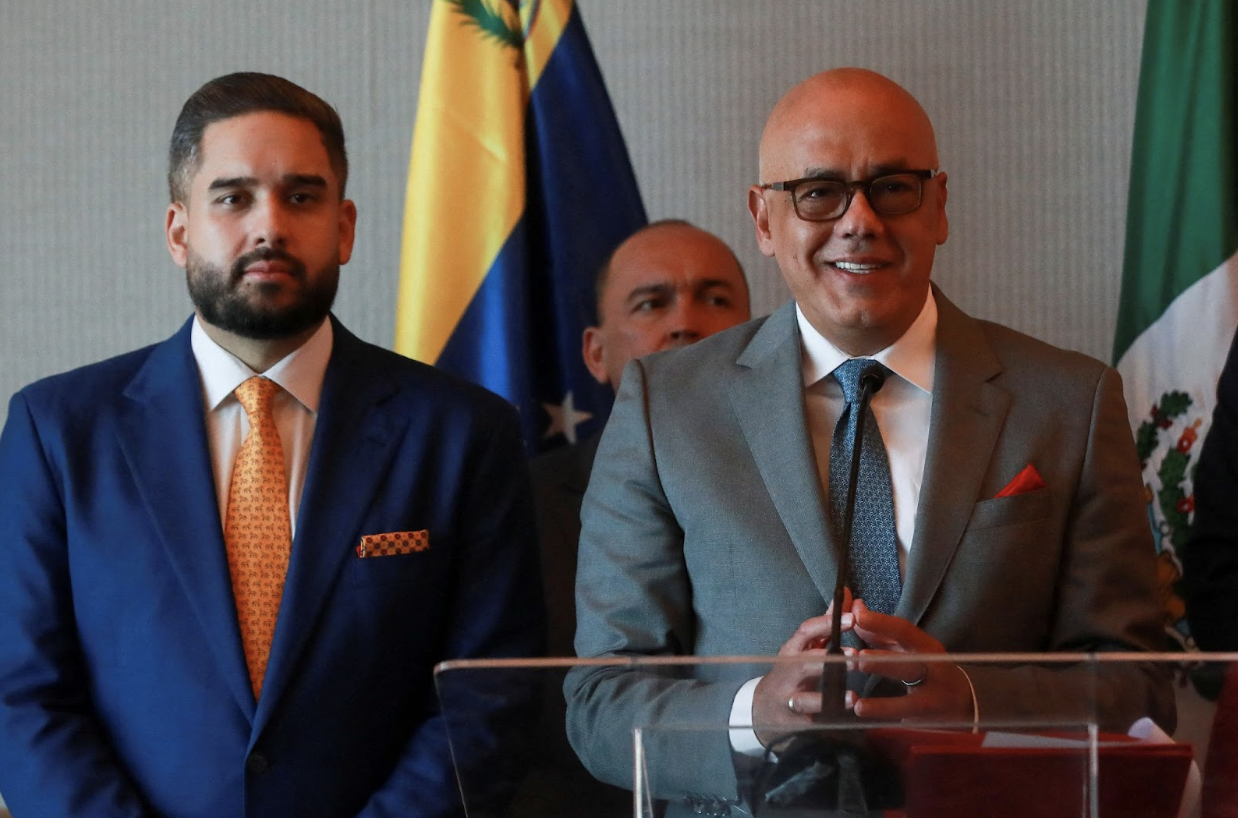Chevron to Resume Oil Pumping in Venezuela after Humanitarian Agreement is Reached
Jorge Rodriguez (right), President of Venezuela's National Assembly and Head of Nicolas Maduro's negotiating team, along with Nicolas Maduro Guerra (left), son of Venezuela's President, in the meeting in Mexico City last weekend. Source: REUTERS/Henry Romero
On Nov. 26, Nicolas Maduro's government and domestic opposition leaders met in Mexico City to discuss solutions for Venezuela's political and economic crises. The meeting followed the United States' proposal to unfreeze Venezuelan government funds and allow Chevron to resume operations in the South American country in exchange for the restoration of democratic institutions.
In the meeting, Venezuelan leadership issued a preliminary agreement to set up a UN-administered humanitarian fund to finance health, food, and education programs for those in need. The parties identified a set of government-owned financial assets in foreign banks that may subsidize the fund once unfrozen. A joint statement by the United States, Canada, the United Kingdom and the European Union affirmed "willingness to review sanctions" as Venezuela demonstrates commitment to its programs.
In response to the deal, the Biden administration granted Chevron a limited license to recommence oil extraction in Venezuela. The terms prevent Chevron from helping the OPEC member to develop new plants, and ban the payment of oil royalties and taxes to the Venezuelan government. Chevron is also prohibited from interacting with Russian-controlled companies operating in the country. The license is valid for a six-month period and can be revoked at any time by the United States.
The American authorization aims at increasing transparency in the Venezuelan oil sector and helping the South American country pay its debts owed to Chevron. However, executives of PDVSA, the state-owned Venezuelan oil and gas company, lost enthusiasm after learning about the terms of Chevron's joint venture. The restrictions on the reimbursement of operational expenses diminish the benefits that the nation's oil producers hoped to reap.
As a consequence, this may compromise Maduro's commitment to participating in further negotiations. This humanitarian agreement is only the first step towards reinstating fair democratic elections in Venezuela. A National Security Council spokesperson stated that the White House is "open to calibrating" sanctions, but that such calibration will depend on the extent to which Maduro abides by the agreement and continues to address all the necessary components to ensure candidates in the 2024 elections have an equal and fair chance in the polls.
The deal comes in a timely fashion given the recent energy crisis due to the Russia-Ukrainian war and production cuts made by OPEC members. Venezuela sits atop the world's largest oil reserves, and its reentry to the global market could be pivotal for Western economies. Considering the Biden administration's previous attempt to undermine the influence of oil prices in order to restore democracy in Venezuela, these negotiations suggest self-serving motives from the US.
Chevron is the second largest oil company headquartered in the United States. Source: AP Photo/Alan Diaz
The underinvestment and poor management of oilfields nonetheless impose challenges for Chevron's production in the South American country. Chevron CEO Mike Wirth commented earlier this year that even if the company was granted the license, it would still take months and potentially years to refurbish the oil plants. Moreover, the license does not intend to have an instantaneous effect on oil supply, but rather, it seeks to pave a normalization path for future transactions.
Notwithstanding the dubious incentives behind the American proposal, the meeting in Mexico City symbolized a "historic milestone" for Venezuelans, as described by the Norwegian mediator Dag Nylander. The humanitarian agreement hints at the potential end of a political stalemate and the reinvigoration of Venezuelan economy. Given that 7.1 million Venezuelans have left the country in the last few years, the fund may help prevent more Venezuelans from fleeing by improving the quality of life and financing infrastructure projects.


